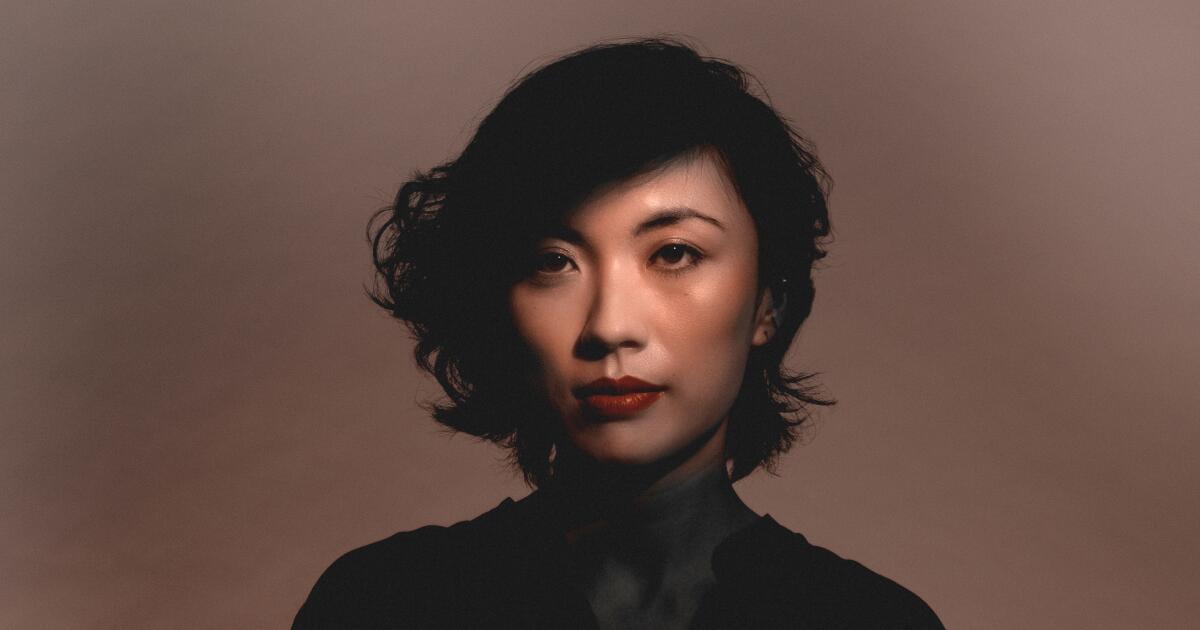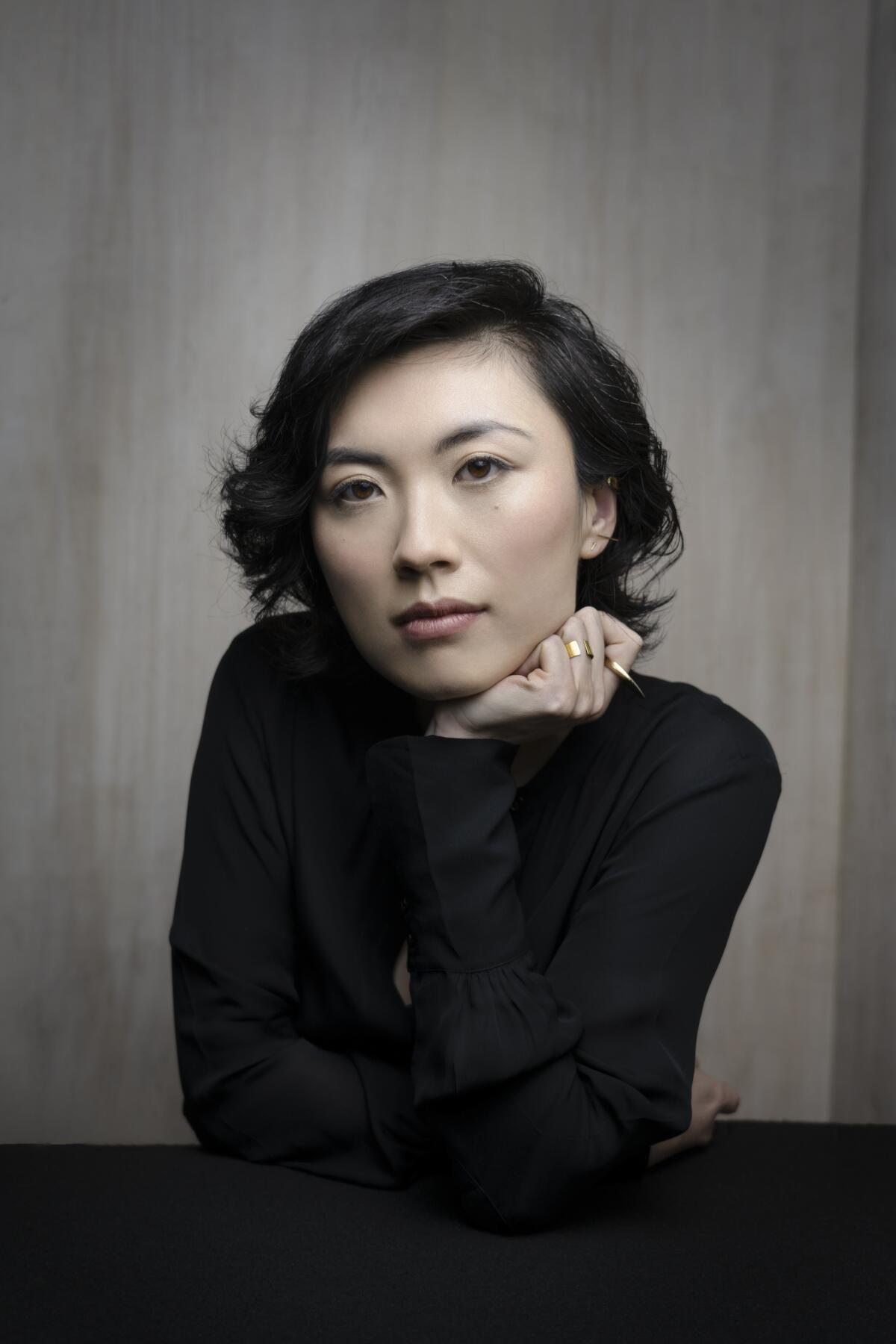
On the Shelf
Land of Milk and Honey
By C Pam Zhang
Riverhead: 240 pages, $28
If you buy books linked on our site, The Times may earn a commission from Bookshop.org, whose fees support independent bookstores.
In a 2020 essay, C Pam Zhang wrote about the way McDonald’s keeps her connected to her father, who would indulge with her in “a conspiratorial Happy Meal” on fishing trips away from her fast-food-disapproving mother. He died when she was 22.
Zhang’s debut novel, “How Much of These Hills is Gold,” explored the lives of Chinese settlers who joined the thousands who panned for gold in California. Released in 2020 during the COVID shutdowns, it earned instant acclaim, even as its author struggled with social isolation, depression and the anxiety of being Chinese American as anti-Asian hate crimes soared. Her solace, once again: McDonald’s.
“Land of Milk and Honey,” Zhang’s newest novel, is set farther afield — on a remote Italian mountaintop in a dystopian future — but it returns to the concept of food in times of crisis. Climate catastrophe has brought widespread famine, and a billionaire has gathered scientists to his Noah’s Ark (along with some very rich friends) to research, preserve and warehouse what crops and animals remain.
Entering this world is Zhang’s unnamed narrator, a child of immigrants — her mother from China, father from Korea — hired to be the community’s chef. Zhang evokes the sensuous delight of working with fresh ingredients in a time when certain flavors are essentially extinct.
But cooking is not the protagonist’s only job, we quickly learn: She is meant to role-play as the billionaire’s Korean wife, who has disappeared, in order to placate the investors. His daughter becomes her lover, and both of them must deal with the fallout of his constant quantification of what — and who — is worth saving.
Zhang spoke with The Times last month via Zoom about pleasure, scarcity and how the pandemic inspired her to ask the big questions that fueled her novel. The conversation has been edited for clarity and length.
Was COVID on your mind as you wrote this book?
I started it in early 2021, and so I suppose I had been blocked on a new project for at least a year. Up until that point, I did feel a lot of despair — a lot of fear that I had lost touch with writing, the thing that most gave me joy.
And some of that was certainly wrapped up in the pandemic. Some of that was wrapped up in the fact of having a first novel come out and then feeling like it wasn’t real in the world, because I didn’t get to see a copy of my book in a bookstore for over a year. It felt like putting a book out to a room full of ghosts.
This is strange for me to say, because all my life I’ve considered myself a bit of a misanthrope, but [it] made me realize how important the human embodied community aspect of it is. A review, no matter how wonderful it is, doesn’t feel as deep as meeting a bookseller in person and hearing why they loved your book. That stays with you, and part of it is physicality.
Physicality plays such a role in this novel, where physical pleasure is a luxury commodity, outside the reach of a world sunk into deprivation.
Pleasure is something that we need to take seriously in order to survive, right? Everyone deserves pleasure, and it shouldn’t only be reserved for the wealthy. I’ll say that I spent a lot of the pandemic deeply disconnected from my body and its desire for pleasure.
There were so many issues that felt bigger and more important than myself, and I became impatient with my body. I had my health, I had a roof overhead, I had food. What else could I ask for? And I beat myself up every time these desires — get on a plane, have a lovely meal in a restaurant — cropped up. But the first meal I had at a restaurant, in Seattle with a doctor friend who had seen much worse during the pandemic, it made me realize how important it was seeing his face, seeing food brought to someone who deserved it. I think, especially for women, it’s easier for us to see when somebody else needs something than to see it in ourselves.

For C Pam Zhang, publishing a breakthrough debut novel, “How Much of These Hills is Gold,” during COVID shutdowns “felt like putting a book out to a room full of ghosts.”
(Clayton Cubitt)
Race is also a clever factor in the story: The narrator is mistaken for another Asian woman. This happens all the time in real life, of course — people joke on Twitter about it.
It’s funny because I think that may come across as some sort of surreal or speculative elements. I think it’s the most realistic part. I love that you referred to it as a joke on Twitter, because I think that was kind of where it was coming from. It’s horrible to realize that people are not seeing you at all. They’re just interacting with a cutout, a stereotype, a silhouette in which they fill in whatever they want. But whenever I interact with my Asian women friends, that anger transmutes into laughter at the people who are so stupid they cannot distinguish between us. But what if that interchangeability becomes an asset on the job market at a time when jobs are incredibly hard to come by?
In a previous interview, you were asked a question about how your books are collaged together, and you started talking about how as a child of immigrants your sense of that nationality, that culture, is filtered through your parents. There is a brilliant scene in the book, involving the narrator’s mother serving food, where she realizes she just experiences pleasure differently. Have you had that experience?
I think pleasure, especially bodily pleasure, is one of the most deeply personal things. No one feels exactly the same as anyone else. I think there’s sort of this desire often, in Western therapy culture, to think that you’re supposed to come to a place of complete understanding and catharsis with your parents as an adult. In writing this book I came up against the limits of that idea.
I think there’s a kind of quiet beauty in leaving some things untranslatable, and just sitting beside someone with very different value systems and understanding, “This is what gives you joy.”
I don’t want a world where the über-rich are sitting on top of the heap and everyone is scrambling for scratch at the bottom. But I also don’t want a world in which I deny anybody the right to pleasure and joy. I do want everyone to have bread and roses, and I think that generosity toward other people often does start with this generosity for your family members.
How does this translate to the world of your book?
I think that ungenerosity, especially for the über-wealthy, comes from a fundamental fear of scarcity. It’s really hard to combat that narrative because we live in a world in which many things are getting worse. The environment is quickly heating up. There’s just a crisis on the horizon every day. I do think it breeds a pessimism that turns into cynicism.
lf you read the news, it’s really easy to feel that way, which is why we have sources that allow for imagination. Climate fiction, speculative fiction, whatever you want to call those emerging genres, they increasingly feel necessary. Fundamentally, it’s about this ability to look at our world and say “yes” and “what if?” I’m not saying that we should sit back and ignore it, but there’s just so much we don’t understand. I think that unknowability can be really, really beautiful and hopeful.
Berry writes for a number of publications and tweets @BerryFLW.












